Don't wanna be here? Send us removal request.
Text
Navigating the Path to PMP Success: A Comprehensive Guide to Exam Preparation
Achieving the Project Management Professional (PMP) certification is a significant milestone for project managers, signifying a high level of expertise and competence in the field. However, the road to PMP success requires diligent preparation and a strategic approach. This article serves as a comprehensive guide to PMP exam preparation, outlining key steps and strategies to maximize your chances of success.

Understand the PMP Exam Format:
Familiarize yourself with the PMP exam structure, which includes multiple-choice questions, multiple response questions, matching questions, and more.
Gain insights into the time constraints and distribution of questions across the various domains of project management.
Review the PMP Exam Content Outline:
Refer to the official PMP Exam Content Outline provided by the Project Management Institute (PMI).
Understand the five domains—Initiating, Planning, Executing, Monitoring and Controlling, and Closing—and their respective tasks and enablers.
Create a Study Plan:
Develop a realistic and structured study plan that aligns with your schedule.
Allocate specific time slots for each knowledge area and domain to ensure comprehensive coverage.
Utilize PMP Exam Prep Resources:
Invest in reputable PMP exam prep materials, including study guides, practice exams, and online courses.
Leverage official PMI resources, such as the PMBOK Guide, as a foundational reference.
Practice with Sample Questions:
Regularly practice with a diverse range of sample questions to familiarize yourself with the question formats and improve time management.
Analyze incorrect answers to identify knowledge gaps and areas for improvement.
Engage in Interactive Learning:
Participate in study groups, forums, or online communities to engage in discussions and exchange insights with fellow PMP candidates.
Collaborate on solving problems and sharing best practices.
Simulate Exam Conditions:
Take full-length, timed practice exams to simulate the actual testing environment.
Evaluate your performance and identify areas that require additional focus.
Focus on Weak Areas:
Concentrate on strengthening your knowledge in areas where you consistently perform poorly in practice exams.
Review the PMBOK Guide and other reference materials for a deeper understanding.
Prioritize Ethical and Professional Responsibility:
Pay special attention to the ethical and professional responsibility domain, as it carries a significant weight in the exam.
Understand the PMI Code of Ethics and Professional Conduct.
Review and Revise:
Conduct periodic reviews of all knowledge areas to reinforce your understanding.
Create summary notes or flashcards for quick revision.
Conclusion:
PMP exam preparation demands dedication, strategic planning, and a thorough understanding of project management principles. By systematically approaching the study process, leveraging high-quality resources, and consistently practicing with realistic exam scenarios, aspiring PMP candidates can enhance their readiness and increase their likelihood of success.
Remember, the PMP certification is not just a test of knowledge but a validation of your ability to apply project management concepts in real-world scenarios. Best of luck on your journey to PMP success!
0 notes
Text
Navigating the Path to PMP Success: A Comprehensive Guide to Exam Preparation
Achieving the Project Management Professional (PMP) certification is a significant milestone for project managers, signifying a high level of expertise and competence in the field.
However, the road to PMP success requires diligent preparation and a strategic approach. This article serves as a comprehensive guide to PMP exam preparation, outlining key steps and strategies to maximize your chances of success.
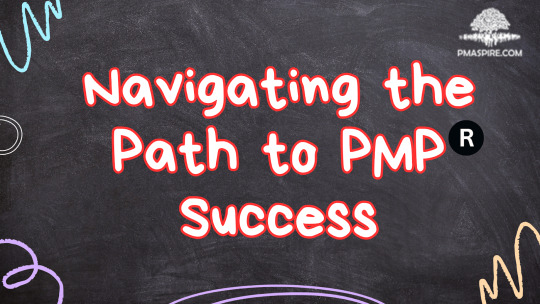
Understand the PMP Exam Format:
Familiarize yourself with the PMP exam structure, which includes multiple-choice questions, multiple response questions, matching questions, and more.
Gain insights into the time constraints and distribution of questions across the various domains of project management.
Review the PMP Exam Content Outline:
Refer to the official PMP Exam Content Outline provided by the Project Management Institute (PMI).
Understand the five domains—Initiating, Planning, Executing, Monitoring and Controlling, and Closing—and their respective tasks and enablers.
Create a Study Plan:
Develop a realistic and structured study plan that aligns with your schedule.
Allocate specific time slots for each knowledge area and domain to ensure comprehensive coverage.
Utilize PMP Exam Prep Resources:
Invest in reputable PMP exam prep materials, including study guides, practice exams, and online courses.
Leverage official PMI resources, such as the PMBOK Guide, as a foundational reference.
Practice with Sample Questions:
Regularly practice with a diverse range of sample questions to familiarize yourself with the question formats and improve time management.
Analyze incorrect answers to identify knowledge gaps and areas for improvement.
Engage in Interactive Learning:
Participate in study groups, forums, or online communities to engage in discussions and exchange insights with fellow PMP candidates.
Collaborate on solving problems and sharing best practices.
Simulate Exam Conditions:
Take full-length, timed practice exams to simulate the actual testing environment.
Evaluate your performance and identify areas that require additional focus.
Focus on Weak Areas:
Concentrate on strengthening your knowledge in areas where you consistently perform poorly in practice exams.
Review the PMBOK Guide and other reference materials for a deeper understanding.
Prioritize Ethical and Professional Responsibility:
Pay special attention to the ethical and professional responsibility domain, as it carries a significant weight in the exam.
Understand the PMI Code of Ethics and Professional Conduct.
Review and Revise:
Conduct periodic reviews of all knowledge areas to reinforce your understanding.
Create summary notes or flashcards for quick revision.
Conclusion:
PMP exam preparation demands dedication, strategic planning, and a thorough understanding of project management principles.
By systematically approaching the study process, leveraging high-quality resources, and consistently practicing with realistic exam scenarios, aspiring PMP candidates can enhance their readiness and increase their likelihood of success.
Remember, the PMP certification is not just a test of knowledge but a validation of your ability to apply project management concepts in real-world scenarios. Best of luck on your journey to PMP success!
0 notes
Text
Benefits of PMP Software
In today's fast-paced and highly competitive business environment, efficient project management is key to achieving success.
Project managers play a crucial role in ensuring that projects are completed on time, within budget, and with the highest level of quality. To streamline the project management process and enhance productivity, many organizations are turning to Project Management Software (PMP software).
In this article, we will explore the various benefits of PMP software and how it can transform your project management efforts.
Project Management Software, often referred to as PMP software, is a valuable tool for organizations looking to streamline and optimize their project management processes. It offers a wide range of benefits that enhance project planning, resource management, communication, and overall project success.
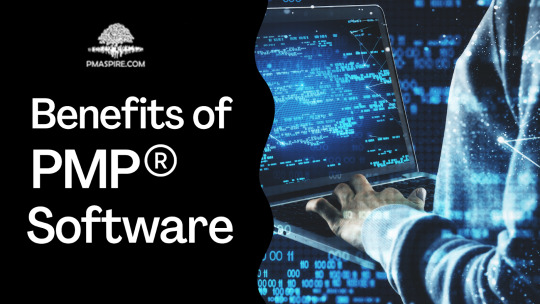
Enhanced Project Planning
One of the primary advantages of using PMP software is the enhanced project planning it provides. These tools offer a centralized platform for project managers to create detailed project plans, set milestones, allocate resources, and define project goals. This level of planning precision ensures that projects are executed efficiently and effectively.
Efficient Resource Management
Resource management is a critical aspect of project management. PMP software allows project managers to allocate resources optimally. It provides insights into the availability of resources, preventing overallocation and ensuring that the right team members are assigned to the right tasks.
Improved Communication
Effective communication is key to project success. PMP software fosters improved communication by offering a platform for team members to collaborate, share project updates, and discuss tasks. It also ensures that stakeholders are well-informed about the project's progress.
Real-Time Project Tracking
PMP software enables real-time project tracking. Project managers can monitor project progress, identify bottlenecks, and make timely adjustments to keep projects on track. This real-time visibility enhances decision-making and problem-solving.
Risk Mitigation
Identifying and mitigating risks is crucial in project management. PMP software assists in risk management by providing tools to identify potential issues and develop strategies to mitigate them. This proactive approach helps prevent costly delays and project failures.
Quality Control
Maintaining high-quality standards is a top priority in project management. PMP software allows for the establishment of quality control processes, ensuring that project deliverables meet the required standards and specifications.
Cost Control
Budget overruns can be a major concern in project management. PMP software helps control costs by providing tools to create and manage project budgets. It tracks expenses and alerts project managers when spending exceeds predefined limits.
Time Savings
Project managers can save a significant amount of time using PMP software. These tools automate repetitive tasks, such as generating reports and tracking project metrics. This time savings allows project managers to focus on more strategic aspects of project management.
Collaboration Made Easy
PMP software facilitates collaboration among team members, regardless of their physical location. Team members can access project information, share updates, and collaborate seamlessly, which is especially important in today's remote work environment.
Data Security
Data security is a top concern in project management. PMP software offers robust security measures to protect sensitive project information. It ensures that only authorized individuals have access to critical project data.
Scalability
Whether your organization handles small projects or large, complex endeavors, PMP software is scalable to accommodate your needs. It can adapt to the size and complexity of your projects, making it a versatile tool for businesses of all sizes.
Customer Satisfaction
By improving project management efficiency, PMP software can lead to increased customer satisfaction. Projects are completed on time, within budget, and with high-quality deliverables, leaving customers happy and eager to work with your organization again.
Competitive Advantage
In today's competitive business landscape, having efficient project management processes can provide a significant advantage. PMP software equips organizations with the tools and capabilities needed to stay ahead of the competition.
Conclusion
In conclusion, PMP software is a valuable asset for organizations seeking to enhance their project management capabilities. It offers a wide range of benefits, including enhanced project planning, efficient resource management, improved communication, and real-time project tracking. By investing in PMP software, businesses can streamline their project management processes, mitigate risks, and gain a competitive edge in their respective industries.
0 notes
Text
The Significance of Project Management Certification
Project management is a critical function in various industries, and certified project managers are in high demand. This article delves into the importance of project management certification, the various types available, their benefits, and how you can become certified.

The Importance of Project Management Certification
In today's competitive job market, having a project management certification sets you apart. Employers seek certified professionals who can effectively manage projects, ensuring they are completed on time and within budget. These certifications validate your skills and expertise, making you a valuable asset to any organization.
Types of Project Management Certifications
PMI Certifications
The Project Management Institute (PMI) offers several certifications, including:
PMP Certification
The Project Management Professional (PMP) certification is one of the most prestigious. It's ideal for experienced project managers and focuses on advanced project management techniques.
CAPM Certification
The Certified Associate in Project Management (CAPM) certification is perfect for entry-level project managers, providing a solid foundation in project management principles.
Agile Certifications
Agile methodologies are becoming increasingly popular in project management. Two notable certifications in this area are:
PMI-ACP Certification
The PMI Agile Certified Practitioner (ACP) certification focuses on agile principles and practices.
CSM Certification
The Certified ScrumMaster (CSM) certification is specific to Scrum, a popular agile framework.
PRINCE2 Certification
The PRINCE2 (Projects IN Controlled Environments) certification is recognized globally and emphasizes process-driven project management.
Benefits of Project Management Certification
Career Advancement
With a project management certification, you can expect:
Improved Job Prospects
Certification makes you more attractive to employers, increasing your chances of landing a job in the field.
Higher Salary Potential
Certified project managers often command higher salaries due to their specialized skills.
Skill Enhancement
Certifications also enhance your skills, including:
Effective Project Management
You'll learn best practices in project management, ensuring successful project completion.
Communication Skills
Effective communication is crucial in project management, and certifications emphasize this skill.
How to Get Certified
Eligibility Requirements
To pursue project management certification, you need to meet specific criteria set by the certifying body.
Preparing for the Exam
Proper preparation is essential for passing the certification exam. This may involve self-study, training courses, or both.
Conclusion
In conclusion, project management certification is a valuable asset in today's job market. It offers numerous benefits, from career advancement to enhanced skills. Whether you opt for a PMI, Agile, or PRINCE2 certification, it's a step toward a successful project management career.
0 notes
Text
Top 5 Tips for PMP® Exam Preparation
In the ever-evolving landscape of professional certifications, the Project Management Professional (PMP®) certification stands out as one of the most esteemed and globally recognized qualifications. Earning your PMP® credential is a significant milestone in your career, opening up opportunities and boosting your credibility in the world of project management.

However, preparing for the PMP® exam can be a rigorous journey, requiring dedication and strategic planning. In this comprehensive guide, we will share the top five tips for PMP® exam preparation to help you not only pass the exam but excel in it.
1. Understand the PMBOK® Guide Inside Out
The Project Management Body of Knowledge (PMBOK® Guide) is the cornerstone of PMP® exam preparation. It's imperative to delve deep into this guide to understand the principles, concepts, and terminology that the exam is built upon. Don't just skim through it; immerse yourself in its contents. The PMBOK® Guide will be your trusty companion throughout your PMP® journey, serving as a reference for the project management best practices you'll need to master.
2. Develop a Well-Structured Study Plan
PMP® exam preparation is not something you can undertake haphazardly. It requires meticulous planning and organization. Create a study plan that outlines your goals, schedules, and the specific knowledge areas you need to focus on. Allocate dedicated time each day for your studies, and ensure that you stick to your plan consistently. This structured approach will help you cover all aspects of the exam and gradually build your knowledge and confidence.
3. Leverage Online Resources and PMP® Prep Courses
In the digital age, we're fortunate to have a wealth of online resources at our fingertips. Make the most of these resources by enrolling in PMP® preparation courses and utilizing reputable PMP® exam study materials. Many online platforms offer practice exams, flashcards, and interactive study aids that can significantly enhance your understanding of PMP® concepts. These resources provide a dynamic learning experience that complements your study plan.
4. Practice, Practice, Practice
One of the key secrets to PMP® success is consistent practice. The PMP® exam is not just a test of theoretical knowledge but also a measure of your practical project management skills. Regularly solving sample questions and taking simulated exams will prepare you for the format and difficulty level of the real exam. It's advisable to take a variety of practice tests to expose yourself to different question styles and scenarios.
5. Join PMP® Study Groups and Engage with the Community
Don't underestimate the power of networking and collaborative learning. Joining PMP® study groups or engaging with online PMP® communities can be a game-changer in your exam preparation. These platforms provide a space to discuss challenging topics, share insights, and gain support from peers who are on the same journey. Learning from others' experiences can broaden your perspective and help you overcome hurdles more efficiently.
In conclusion, achieving PMP® certification is a prestigious accomplishment that can elevate your career in project management. By thoroughly understanding the PMBOK® Guide, creating a well-structured study plan, leveraging online resources, consistent practice, and engaging with the PMP® community, you can maximize your chances of acing the PMP® exam. Remember, it's not just about passing the exam but truly mastering the principles of project management. Your dedication and commitment will be rewarded with a credential that will open doors to exciting career opportunities.
Conclusion
In summary, achieving PMP® certification is an esteemed achievement that can propel your career to new heights in the realm of project management. By thoroughly mastering the PMBOK® Guide, constructing a well-structured study plan, leveraging online resources, consistently practicing, and engaging with the PMP® community, you can maximize your chances of excelling in the PMP® exam. Remember, it's not just about passing the exam; it's about genuinely mastering the principles of project management. Your dedication and commitment will be rewarded with a credential that opens doors to exciting career opportunities.
0 notes
Text
Unlocking Success: Your Comprehensive Guide to the CAPM® Exam Simulator
In the dynamic world of project management, gaining the CAPM® (Certified Associate in Project Management) certification can be a game-changer.
This prestigious certification serves as a stepping stone for aspiring project managers, opening doors to a world of opportunities and enhancing your professional credibility.
To embark on this journey, you need the right tools, and that's where the CAPM® Exam Simulator comes into play.
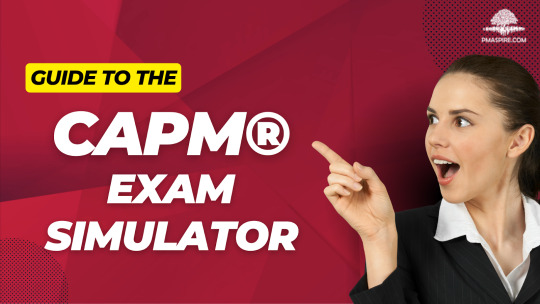
What is the CAPM® Exam Simulator?
The CAPM® Exam Simulator is not just another resource; it's your ultimate companion on the path to CAPM® certification. This comprehensive tool is designed to prepare you for the CAPM® exam, providing an immersive learning experience that ensures your success.
Features and Benefits
1. Realistic Practice Exams
The heart of the CAPM® Exam Simulator lies in its collection of realistic practice exams. These exams are meticulously crafted to mimic the actual CAPM® exam, giving you a taste of what to expect on the big day. This invaluable feature allows you to:
Familiarize Yourself with the Exam Format
Assess Your Current Knowledge and Identify Weaknesses
Build Confidence and Reduce Exam-Day Anxiety
2. Extensive Question Bank
Diversity is key when preparing for the CAPM® exam, and the CAPM® Exam Simulator delivers precisely that. With an extensive question bank covering all knowledge areas and process groups, you can:
Gain a Holistic Understanding of Project Management Concepts
Target Specific Areas for Improvement
Improve Your Overall Proficiency
3. Detailed Explanations
Each question in the simulator is accompanied by a detailed explanation of the correct answer. This is an invaluable resource for understanding the reasoning behind each answer choice. It's not just about getting the right answer; it's about comprehending the underlying concepts, making your learning more effective.
4. Progress Tracking
The CAPM® Exam Simulator offers a robust progress tracking feature that helps you keep tabs on your advancement. You can monitor your scores, identify trends, and adjust your study plan accordingly. This data-driven approach ensures that your preparation is on the right track.
5. Interactive Learning
Learning is most effective when it's engaging, and the CAPM® Exam Simulator knows this well. It offers an interactive learning experience with various modes, including timed and untimed quizzes. This adaptability enables you to tailor your study sessions to your needs.
Why Choose the CAPM® Exam Simulator?
1. Quality Assurance
The CAPM® Exam Simulator is a product of dedication and expertise. It's crafted by a team of certified project management professionals who have a deep understanding of the CAPM® exam's intricacies. This level of quality assurance is unparalleled and ensures that you receive the most accurate and up-to-date study materials.
2. Convenience
We understand that aspiring project managers have busy schedules. The CAPM® Exam Simulator is designed to fit seamlessly into your life. Access it anytime, anywhere, and on any device. This flexibility empowers you to study at your convenience, whether you're on your daily commute or relaxing at home.
3. Cost-Effective
Investing in your professional development should not break the bank. The CAPM® Exam Simulator offers a cost-effective solution compared to traditional classroom courses. You get the same level of quality education without the hefty price tag.
4. Success Guarantee
Your success in the CAPM® exam is our ultimate goal. We are confident in the effectiveness of the CAPM® Exam Simulator, and we back it with a success guarantee. If you don't pass the CAPM® exam on your first attempt after using our simulator, you'll get an extension of your access—no questions asked.
How to Get Started
Getting started with the CAPM® Exam Simulator is a straightforward process:
Sign Up: Visit our website and sign up for the CAPM® Exam Simulator. Choose the plan that suits your needs.
Access the Platform: Once you've signed up, you'll receive access to the simulator. You can start your journey immediately.
Study and Practice: Begin your preparation by taking practice exams, reviewing detailed explanations, and tracking your progress.
Achieve Success: With dedication and the right tools, you'll be well-prepared to pass the CAPM® exam on your first attempt.
Conclusion
In the world of project management, the CAPM® certification can be your passport to success. The CAPM® Exam Simulator is your trusted companion on this journey, providing you with the knowledge and confidence needed to ace the CAPM® exam. It's more than just a tool; it's a key to unlocking new career opportunities and professional growth.
Don't leave your CAPM® certification to chance. Choose the CAPM® Exam Simulator and take the first step toward a brighter future in project management.
0 notes
Text
PMP® Exam: Current Format vs. New Format
In the ever-evolving landscape of project management, staying abreast of the latest trends and developments is not only advisable but often a necessity.
One of the most significant shifts in recent times has been the impending change in the Project Management Professional (PMP®) exam format.
This article delves into a comparative analysis of the current format versus the new format of the PMP® exam, shedding light on what aspiring project managers should expect and prepare for in their certification journey.

Understanding the PMP® Certification
Before we dive into the intricacies of the exam format, it's imperative to grasp the significance of the PMP® certification.
Awarded by the Project Management Institute (PMI), the PMP® certification is widely recognized as a benchmark for excellence in project management. It is esteemed by organizations across the globe, making certified professionals highly sought after.
The Current PMP® Exam Format
1. Five Domains
The current PMP® exam format revolves around five domains of project management, which include Initiating, Planning, Executing, Monitoring and Controlling, and Closing. These domains serve as the framework for understanding project management processes and knowledge areas.
2. 200 Multiple-Choice Questions
As of the current format, the PMP® exam consists of 200 multiple-choice questions. These questions test candidates on their understanding of the five domains, assessing their ability to apply project management principles to real-world scenarios.
3. Four Hours Duration
Candidates have a total of four hours to complete the exam. This timeframe allows for a comprehensive assessment of their project management knowledge, skills, and competencies.
The New PMP® Exam Format
1. Three Domains
The new PMP® exam format will focus on three domains, which are People, Process, and Business Environment. This shift aims to reflect the changing landscape of project management, emphasizing the importance of a holistic approach to project success.
2. 180 Multiple-Choice Questions
In the new format, the number of questions has been reduced to 180. This change allows for a more focused examination of the candidate's competencies and their ability to adapt to different project scenarios.
3. Two Hours Duration
With a time limit of two hours, the new format places an emphasis on efficiency and decision-making under time constraints, mirroring the real-world challenges that project managers often face.
Comparative Analysis
Now, let's compare the current and new PMP® exam formats in a more detailed manner:
Content Emphasis
Current Format: The current format places equal importance on five domains, ensuring that candidates have a broad understanding of various aspects of project management.
New Format: The new format focuses on three domains, indicating a shift towards a more concentrated and holistic view of project management, aligning with the evolving industry standards.
Question Quantity
Current Format: 200 questions provide a comprehensive evaluation of a candidate's knowledge but can be time-consuming.
New Format: 180 questions reduce the testing time, requiring candidates to answer each question more efficiently.
Time Management
Current Format: With four hours, time management is essential but slightly less intense compared to the new format.
New Format: Two hours place greater pressure on candidates to manage their time effectively, akin to the challenges of real-world project management.
Preparing for the Transition
The transition from the current to the new PMP® exam format is a significant one. To excel in the new format, aspiring project managers should consider the following:
Update Your Study Materials: Ensure that your study materials align with the new exam content outline provided by PMI.
Practice Efficient Time Management: Given the reduced timeframe, practice time management strategies during your preparation.
Master the New Domains: Concentrate on the People, Process, and Business Environment domains to adapt to the changing landscape of project management.
In Conclusion
The PMP® exam, a hallmark of project management excellence, is undergoing a transformation in its format. The shift from the current five-domain structure to the new three-domain approach signifies a more streamlined and holistic view of project management.
Understanding these changes and adapting your preparation strategy accordingly is pivotal to your success. So, whether you are contemplating taking the PMP® exam in the current format or gearing up for the new one, thorough preparation is the key to achieving your certification goals.
0 notes
Text
PMI-ACP® VS PMP®: Which is Better – PMP® or PMI-ACP®?
In the ever-evolving world of project management, two certifications have been making waves – the Project Management Professional (PMP®) and the PMI® Agile Certified Practitioner (PMI-ACP®). Choosing between these two prestigious certifications can be a perplexing decision. In this article, we will explore the key differences and help you decide which one is better suited for your career goals.
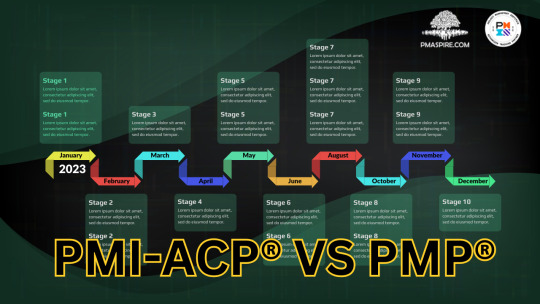
Understanding the Basics
PMP® - Project Management Professional
The PMP® certification, offered by the Project Management Institute (PMI), is renowned worldwide and focuses on the traditional, or Waterfall, project management methodology. It equips professionals with a comprehensive set of tools and techniques for managing projects efficiently.
PMI-ACP® - Agile Certified Practitioner
On the other hand, the PMI-ACP® certification is relatively newer, emphasizing Agile methodologies. Agile is all about adaptability and flexibility, ideal for industries that require rapid changes and quick deliveries.
Comparing the Focus
PMP®: Traditional vs. PMI-ACP®: Agile
One significant distinction between these certifications is their focus. The PMP® certification is best suited for professionals who manage projects in industries where the scope, cost, and timelines are well-defined, and change is not frequent. In contrast, the PMI-ACP® is for those working in industries like software development, where change is a constant, and adaptability is crucial.
Eligibility and Prerequisites
PMP®: Experience vs. PMI-ACP®: Agile Knowledge
To pursue the PMP® certification, candidates need a minimum of 3 years of project management experience and a 35-hour formal project management education. This certification is for professionals with substantial project management experience.
In contrast, the PMI-ACP® does not require extensive project management experience. It focuses more on understanding and applying Agile principles and methodologies.
Exam Structure
PMP®: Knowledge-Based vs. PMI-ACP®: Scenario-Based
The PMP® exam is known for its extensive coverage of project management knowledge areas. It consists of 200 multiple-choice questions, focusing on various aspects of project management, from scope management to risk management.
On the other hand, the PMI-ACP® exam consists of scenario-based questions that assess a candidate's ability to apply Agile principles in real-world situations. It covers Agile practices, tools, and techniques.
Career Opportunities
PMP®: Versatility vs. PMI-ACP®: Specialization
The PMP® certification is versatile and widely recognized. It opens doors to various industries, allowing professionals to manage projects in any field.
Conversely, the PMI-ACP® certification is highly specialized in Agile methodologies, making it ideal for those who want to focus exclusively on Agile project management.
Salary Potential
PMP®: High Earning Potential
The PMP® certification generally commands a higher salary due to its versatility and the high demand for professionals with traditional project management skills.
PMI-ACP®: Agile Expertise
While the PMI-ACP® certification may not guarantee as high a salary as the PMP®, it's still a valuable credential in industries that heavily rely on Agile practices.
Maintenance and PDUs
PMP®: Continuous Learning vs. PMI-ACP®: Agile Education
To maintain the PMP® certification, professionals must earn Professional Development Units (PDUs) by engaging in continuous learning and professional development activities.
In contrast, the PMI-ACP® certification focuses on Agile education and encourages professionals to stay updated with the latest Agile practices.
Conclusion
In the debate of PMP® vs. PMI-ACP®, there's no one-size-fits-all answer. Your choice should align with your career goals, industry, and your passion for project management methodologies. The PMP® certification offers versatility and traditional project management skills, while the PMI-ACP® certification provides specialization in Agile practices.
So, it ultimately boils down to what you're passionate about and the industry you plan to build your career in. Both certifications have their merits, and the decision lies in your hands.
0 notes
Text
What is an Online Membership System?
In today's digital age, online membership systems have become an integral part of various organizations and communities. These systems provide a convenient and efficient way to manage memberships, subscriptions, and user access to exclusive content or services. Whether you're running a non-profit organization, a fitness club, or an e-learning platform, online membership systems can streamline your operations and enhance the member experience. This article delves into the world of online membership systems, exploring their significance, features, benefits, and much more.

The Importance of Online Membership Systems
Online membership systems are crucial for modern organizations for several reasons. First and foremost, they simplify the process of onboarding and managing members. Rather than relying on manual paperwork, everything can be done digitally, making the whole experience smoother and more user-friendly.
Key Features of Online Membership Systems
These systems offer a range of features to facilitate effective membership management. These features include:
User Registration: Members can easily sign up online, saving time and effort.
Member Profiles: Users can update their information, track their activities, and manage their subscriptions.
Payment Processing: Collecting membership fees or subscription payments is streamlined and secure.
Content Access Control: Control who can access specific content or services.
Communication Tools: Send newsletters, updates, and notifications to members.
Benefits for Organizations
Implementing an online membership system can be a game-changer for organizations. Some key benefits include:
Improved Efficiency
Online systems reduce administrative workload significantly. Automated processes save time and resources.
Enhanced Data Management
Centralized member data is easy to access and update, ensuring accuracy and compliance.
Scalability
Online systems can handle a growing number of members without major disruptions.
Marketing Insights
Collect data on member behavior and preferences, helping tailor your offerings.
Benefits for Members
Online membership systems also offer advantages to the members themselves:
Convenience
Members can join, renew, or manage their memberships at any time, from anywhere.
Personalization
Access to tailored content or services based on member profiles and preferences.
Communication
Stay informed about updates, events, and exclusive offers.
Types of Online Membership Systems
There are various types of online membership systems to choose from, including:
Traditional Membership: Basic membership management with essential features.
Subscription-Based: Ideal for recurring services or content access.
Tiered Membership: Offers different levels of access or perks based on membership tier.
Association Management: Tailored for non-profit and professional associations.
Setting up an Online Membership System
To set up an online membership system, you need to follow these steps:
Choose the Right Platform
Select a platform that aligns with your organization's needs and goals.
Customization and Branding
Personalize your system to reflect your brand and values.
Managing Member Data
Carefully manage member data, ensuring accuracy and privacy.
Security and Privacy
Implement robust security measures to protect member information.
Pricing Models
Determine your pricing structure, whether it's monthly, annually, or otherwise.
Marketing and Growth Strategies
To attract and retain members, employ marketing strategies such as email campaigns, social media promotions, and referral programs.
Success Stories
Share success stories of organizations that have benefited from online membership systems. Real-life examples can inspire others to make the switch.
Conclusion
In conclusion, online membership systems are a powerful tool for modern organizations and communities. They enhance efficiency, member engagement, and data management. By choosing the right system, customizing it to your brand, and implementing sound marketing strategies, you can create a thriving online community. If you haven't already, it's time to consider implementing an online membership system for your organization.
0 notes
Text
The PMP® Certification: The Exam and Its Structure
The Project Management Professional (PMP)® certification is a highly respected credential for project managers. It demonstrates an individual's competence and expertise in the field of project management. This article will provide a comprehensive overview of the PMP® Certification exam and its structure.
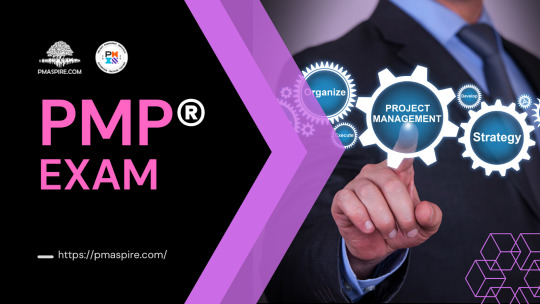
What is PMP® Certification?
PMP® Certification is awarded by the Project Management Institute (PMI) and is recognized globally. It is a testament to a project manager's knowledge, skills, and abilities. Achieving this certification is a significant milestone in a project manager's career.
Why is PMP® Certification important?
PMP® Certification is essential for several reasons. It validates your project management skills and can open doors to better job opportunities and higher salaries. Many organizations prefer hiring PMP®-certified professionals to lead their projects due to the proven expertise and experience they bring.
Overview of the PMP® Exam
The PMP® Certification exam is a rigorous test that assesses a candidate's ability to manage projects effectively. To earn the certification, you must pass this exam, which consists of multiple-choice questions.
Eligibility requirements for PMP® Certification
To be eligible for the PMP® Certification exam, you need a four-year degree, 36 months of leading projects, and 35 hours of project management education. If you have a secondary degree, the project management experience requirement increases to 60 months.
PMP® Exam format and duration
The PMP® exam comprises 180 multiple-choice questions. You have 230 minutes (3 hours and 50 minutes) to complete it. The questions are designed to test your knowledge, situational analysis, and decision-making skills.
PMP® Exam content and domains
The PMP® exam is divided into five domains, each representing different aspects of project management. These domains include Initiating, Planning, Executing, Monitoring and Controlling, and Closing. You must demonstrate proficiency in all of them to pass the exam.
Passing score for PMP® Certification
To pass the PMP® exam, you need to score above the passing mark, which is determined by PMI and may vary from one exam to another. PMI uses a complex scoring system that considers the difficulty level of the questions.
PMP® Exam fees and registration process
The cost of the PMP® exam varies depending on your PMI® membership status and the exam location. PMI® members generally receive a discount on the exam fee. To register for the exam, you need to create an account on the PMI® website, fill out the application, and schedule your exam at a Pearson VUE test center.
Preparing for the PMP® Exam
To increase your chances of success, it's essential to prepare thoroughly for the PMP® exam. Here are some steps you can take:
Choosing the right study materials: Invest in high-quality PMP® study materials, including books, online courses, and practice exams.
Creating a study plan: Develop a study schedule that covers all the PMP® domains and leaves sufficient time for revision.
Mock tests and practice exams: Take as many practice tests as possible to familiarize yourself with the exam format and improve your time management skills.
Tips for effective exam preparation: Stay organized, seek help from PMP®-certified professionals, and understand the PMBOK (Project Management Body of Knowledge) guide.
Taking the PMP® Exam
On the day of the exam, arrive at the test center with a government-issued ID, and expect to undergo a security check. The exam is computer-based, and you'll have access to an on-screen calculator. Keep these tips in mind:
What to expect on exam day: Arrive early, stay calm, and follow the test center's guidelines.
Tips for managing time during the exam: Budget your time wisely, and don't get stuck on challenging questions.
Common challenges and how to overcome them: Stay focused and trust in your preparation.
After the PMP® Exam
Once you've completed the PMP® exam and passed, you'll receive your PMP® Certification. It's essential to maintain your certification by earning Professional Development Units (PDUs) through continuing education and involvement in project management activities.
Benefits of being a PMP®-certified professional
Being PMP®-certified can significantly boost your career. You become part of a prestigious community of project managers and gain access to valuable resources and networking opportunities. Employers also value PMP®-certified professionals and often offer them better career prospects.
Conclusion
In conclusion, the PMP® Certification is a prestigious credential that demonstrates your expertise in project management. It opens up numerous career opportunities and sets you apart in the field. If you're a project manager looking to advance your career, consider pursuing the PMP® Certification.
0 notes
Text
Roadmap for Successful PMP® Certification Journey
Are you ready to embark on a journey towards obtaining your PMP® (Project Management Professional) certification? Congratulations! This certification can significantly enhance your career prospects and validate your expertise in project management. To help you navigate this exciting but challenging path, we've prepared a comprehensive roadmap that will guide you through the entire PMP® certification process.
Understanding PMP® Certification
What is PMP® Certification?
PMP® certification is a globally recognized credential offered by the Project Management Institute (PMI) that signifies your proficiency in project management principles and practices.
Why Pursue PMP® Certification?
Learn why PMP® certification is worth pursuing and how it can boost your career.
Prerequisites and Eligibility
Prerequisites for PMP® Exam
Discover the prerequisites you need to meet before applying for the PMP® exam.
Eligibility Criteria
Understand the specific eligibility criteria set by PMI for PMP® candidates.
Application Process
Filling Out the Application
Step-by-step guidance on completing your PMP® application accurately.
Audit Process
Learn about the potential audit process and how to prepare for it.
Exam Preparation
Study Resources
Explore a variety of study resources, including books, courses, and practice exams.
Creating a Study Plan
Tips for creating a personalized study plan that suits your schedule and learning style.
Exam Content and Format
Understanding the Exam
Get insights into the structure and format of the PMP® exam.
Exam Domains
Learn about the five domains covered in the PMP® exam and their importance.
Tips for Exam Day
Exam-Day Strategies
Discover valuable tips for managing stress and maximizing your performance on exam day.
Post-Exam Activities
After the Exam
What to expect after completing your PMP® exam and how to track your results.
Continuing Education
Understand the Continuing Certification Requirements (CCR) program and how to maintain your certification.
Benefits of PMP® Certification
Career Advancement
Learn how PMP® certification can open doors to new career opportunities.
Increased Earning Potential
Explore the financial benefits associated with being a PMP® certified professional.
Conclusion
Obtaining your PMP® certification is a significant achievement that can lead to exciting career prospects. By following this roadmap, you'll be well-prepared to tackle the PMP® certification journey with confidence.
0 notes
Text
The PMP® Exam Experience Right Now
In recent times, the Project Management Professional (PMP®) exam experience has undergone significant changes. With the evolving landscape of project management and the need for professionals to adapt to new trends, it's essential to stay updated on what to expect when taking the PMP® exam today. In this article, we will guide you through the current PMP® exam experience, offering valuable insights and tips to help you succeed.
The Evolution of the PMP® Exam
The PMP® exam has evolved to align with the changing demands of the project management industry. This evolution is primarily driven by the Project Management Institute (PMI) to ensure that PMP® certified professionals are well-prepared to meet the challenges of modern project management.
1. New Exam Content Outline
One of the most significant changes is the introduction of a new exam content outline. The PMP® exam now focuses on three domains: People, Process, and Business Environment. These domains encompass various knowledge areas that project managers must master.
2. The Agile Perspective
In response to the increasing adoption of Agile methodologies, the PMP® exam now includes questions related to Agile practices. This reflects the industry's shift towards Agile project management as a valuable approach to deliver successful projects.
Preparing for the PMP® Exam
Success in the PMP® exam requires thorough preparation. Here are some key steps to ensure you are ready for the challenge:
3. Understand the Exam Format
The PMP® exam format has also changed. It is now a computer-based test, administered through Pearson VUE test centers or online proctored exams. Familiarize yourself with the exam interface and practice using sample questions.
4. Comprehensive Study Materials
Invest in high-quality study materials, such as official PMI resources and reputable PMP® exam prep courses. These materials cover the new exam content outline and help you gain a deep understanding of the required knowledge.
5. Create a Study Plan
Develop a structured study plan that includes a timeline for covering all the domains and knowledge areas. Allocate dedicated study time each day to ensure consistent progress.
Taking the PMP® Exam
When the day of the exam arrives, it's essential to be well-prepared both mentally and logistically.
6. Arrive Early
If you are taking the exam at a physical test center, arrive early to ensure you have ample time for check-in procedures.
7. Relaxation Techniques
Combat exam anxiety with relaxation techniques such as deep breathing and visualization. Stay calm and focused throughout the exam.
During the Exam
During the PMP® exam, keep these strategies in mind to maximize your performance:
8. Time Management
Manage your time wisely. Allocate a specific amount of time to each question, and if you're unsure, mark questions for review and come back to them later.
9. Read Carefully
Read each question and answer option carefully. The PMP® exam may present scenarios that require careful consideration.
After the Exam
Once you've completed the PMP® exam, there are essential steps to take post-examination.
10. Review Your Results
Review your exam results to identify areas where you performed well and areas that may need improvement.
11. Continuing Education
As part of maintaining your PMP® certification, you'll need to earn Professional Development Units (PDUs) through ongoing education and professional development activities.
Conclusion
The PMP® exam experience has evolved to encompass the changing landscape of project management. By understanding the new exam format, preparing thoroughly, and adopting effective exam-taking strategies, you can navigate this journey successfully.
0 notes
Text
PMP® Exam Practice: Your Roadmap to Success
In the world of project management, the PMP (Project Management Professional) certification is a valuable asset. It's a certification that can open doors to new career opportunities and validate your expertise in managing projects effectively.
However, passing the PMP exam is no small feat. To succeed, you need to invest time and effort into rigorous preparation and practice. In this article, we'll guide you through the essential steps of PMP exam practice and provide valuable insights to help you excel.
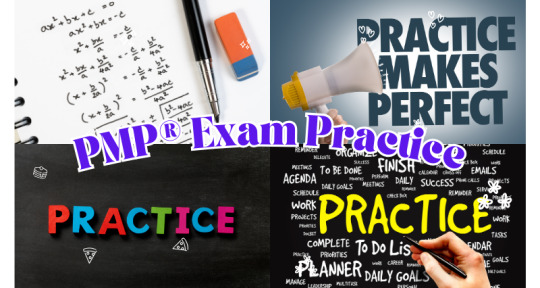
Understanding the PMP® Exam
The PMP exam, administered by the Project Management Institute (PMI), is a rigorous test of your project management knowledge and skills. It consists of 180 multiple-choice questions that cover various aspects of project management, based on the PMBOK (Project Management Body of Knowledge) guide. The exam assesses your ability to apply project management concepts in real-world scenarios.
Benefits of PMP® Certification
Earning your PMP certification can significantly boost your career. It demonstrates your commitment to the profession and your ability to lead projects successfully. Many organizations prefer or require their project managers to hold a PMP certification, making it a valuable credential in the competitive job market.
Creating a Study Plan
To succeed in the PMP exam, you need a well-structured study plan. Start by assessing your current knowledge and identifying your strengths and weaknesses. Set clear goals and milestones to track your progress throughout your preparation journey.
PMP® Exam Study Resources
There are various study resources available to help you prepare for the PMP exam. These include official PMI materials, online courses, textbooks, and study guides. Choose resources that align with your learning style and preferences.
Mock Exams and Practice Tests
Practice makes perfect. Take advantage of mock exams and practice tests to familiarize yourself with the exam format and types of questions. This will help you build confidence and reduce anxiety on exam day.
Time Management Tips
Time management is crucial during the PMP exam. Allocate a specific amount of time to each question and stick to it. If you encounter a challenging question, mark it for review and move on. Manage your time wisely to ensure you complete all questions.
Mastering PMBOK Guide
The PMBOK guide is the foundation of the PMP exam. Study it thoroughly and understand the key concepts, processes, and knowledge areas. Use it as a reference throughout your preparation.
PMP® Exam Question Types
The PMP exam includes different question types, such as situational, formula-based, and scenario-based questions. Familiarize yourself with each type and practice solving them effectively.
Critical Exam Day Strategies
On the day of the exam, arrive early, and bring all necessary documents. Stay calm and focused during the test. Start with questions you are confident about and come back to challenging ones later. Manage your time wisely to ensure you complete the entire exam.
Staying Calm under Pressure
Exam anxiety is common, but it can be managed. Practice relaxation techniques and deep breathing to stay calm under pressure. Remember that you've prepared extensively, and you are capable of passing the exam.
Analyzing Practice Test Results
Regularly review your practice test results. Identify areas where you need improvement and adjust your study plan accordingly. Focus on strengthening your weaknesses.
Continuous Improvement
PMP exam practice is an ongoing process. Keep refining your knowledge and skills by staying updated with the latest industry trends and best practices in project management.
Seek Professional Guidance
Consider enrolling in a PMP exam preparation course or hiring a mentor. Professional guidance can provide valuable insights and keep you on the right track.
The Power of Peer Groups
Joining a study group or online forums with fellow PMP aspirants can be motivating and helpful. You can share experiences, tips, and resources with peers.
Conclusion
Passing the PMP exam is a significant achievement that can propel your career to new heights. With dedicated PMP exam practice, a solid study plan, and the right resources, you can confidently tackle the exam and emerge victorious.
0 notes
Text
PMP® vs PMI ACP®: Which Project Management Certification is Right for You?
In the fast-paced world of project management, having the right certification can make all the difference in your career. Two popular choices among professionals are the Project Management Professional (PMP) and the Agile Certified Practitioner (PMI-ACP) certifications. Both offer unique advantages, but they cater to different project management approaches. In this article, we'll explore the differences between PMP and PMI-ACP certifications to help you make an informed decision.
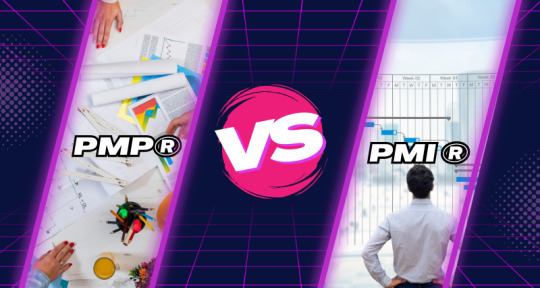
Understanding PMP® Certification
What is PMP Certification?
The PMP certification, offered by the Project Management Institute (PMI), is a globally recognized credential designed for professionals who manage projects using traditional, waterfall methodologies. It focuses on the five process groups: Initiating, Planning, Executing, Monitoring and Controlling, and Closing.
Eligibility and Requirements
To qualify for the PMP exam, you need:
A four-year degree and at least three years of project management experience.
A secondary degree (high school diploma, associate's degree) and at least five years of project management experience.
35 hours of project management education.
Exam Format
The PMP exam consists of 200 multiple-choice questions, covering a wide range of project management topics. You have four hours to complete the exam.
PMI-ACP Certification: Embracing Agile Principles
What is PMI-ACP® Certification?
The PMI-ACP certification, also offered by PMI, is geared towards professionals who work in Agile environments. It encompasses various Agile methodologies such as Scrum, Kanban, Lean, and more. This certification reflects the growing trend of Agile project management.
Eligibility and Requirements
To be eligible for the PMI-ACP exam, you need:
A secondary degree (high school diploma, associate's degree) or higher.
At least 2,000 hours of general project management experience.
A minimum of 1,500 hours working on Agile project teams, or with Agile methodologies.
21 hours of Agile education.
Exam Format
The PMI-ACP exam consists of 120 multiple-choice questions and is completed within three hours. It covers Agile principles, practices, tools, and techniques.
PMP® vs PMI-ACP®: Key Differences
Methodologies
PMP focuses on traditional project management methodologies.
PMI-ACP embraces Agile methodologies.
Eligibility
PMP requires more project management experience but does not mandate Agile experience.
PMI-ACP necessitates Agile experience but has lower overall project management experience requirements.
Exam Content
PMP covers a broad range of project management topics.
PMI-ACP dives deep into Agile methodologies and practices.
Industry Recognition
PMP is widely recognized in various industries and is often a requirement for senior project management roles.
PMI-ACP is gaining recognition, especially in the IT and software development sectors.
Which Certification is Right for You?
The choice between PMP and PMI-ACP depends on your career goals and the nature of projects you manage. Consider the following:
If you work in industries like construction, healthcare, or manufacturing, where traditional project management is prevalent, PMP may be the better choice.
If you are involved in software development, IT, or other sectors where Agile methodologies are the norm, PMI-ACP could be more beneficial.
Ultimately, both certifications can enhance your project management skills and open up new career opportunities.
Conclusion
In the world of project management, having the right certification can significantly boost your career prospects. PMP and PMI-ACP are two valuable options, each catering to different project management methodologies. Assess your experience, career goals, and industry trends to make an informed decision about which certification aligns best with your aspirations.
0 notes
Text
11 Best Membership Management System in 2023
In the digital age, where organizations of all sizes are constantly seeking efficient ways to manage their memberships, having the right Membership Management System (MMS) can make all the difference. Whether you run a non-profit, a sports club, or an online community, the choice of an MMS can significantly impact how you engage with your members, streamline operations, and enhance the overall experience. In this comprehensive guide, we present the 11 best Membership Management Systems in 2023 to help you make an informed decision and stay ahead in your endeavors.
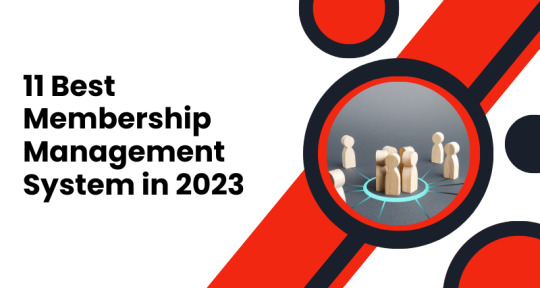
1. WildApricot
WildApricot is a versatile and user-friendly MMS that caters to a wide range of organizations, from associations to small businesses. With its intuitive interface, event management capabilities, and online payment processing, it stands as a top choice for those seeking a well-rounded solution.
2. MemberClicks
MemberClicks is a robust MMS that excels in serving associations and chambers of commerce. It offers features like event registration, email marketing, and a member directory. Its customization options make it a favored choice among organizations looking for tailor-made solutions.
3. TidyHQ
TidyHQ is a powerful MMS designed to simplify the administrative tasks of clubs, societies, and non-profits. It offers membership tracking, event management, and financial reporting, all in one place. Its user-friendly interface ensures ease of use for all members.
4. MemberSuite
MemberSuite is an enterprise-grade MMS ideal for large associations and professional societies. It provides robust data management, e-commerce capabilities, and integrates seamlessly with other systems, making it an efficient choice for complex organizations.
5. ZenberShip
ZenberShip is a cloud-based MMS designed to meet the needs of small and medium-sized businesses. It offers membership tracking, event management, and communication tools at an affordable price point. Its scalability ensures it can grow with your organization.
6. YourMembership
YourMembership offers a comprehensive suite of tools for associations, non-profits, and chambers of commerce. From member management to event registration and email marketing, it's a one-stop solution for organizations seeking efficiency and growth.
7. StarChapter
StarChapter is tailored for local chapters and associations. It provides a platform for website management, event registration, and member engagement. Its user-friendly approach makes it a top choice for local organizations looking to enhance their online presence.
8. ClubExpress
ClubExpress is an all-in-one MMS catering to clubs and associations. It offers features like website building, member management, and event registration. Its integrated approach simplifies administrative tasks and fosters member engagement.
9. Novi AMS
Novi AMS specializes in serving associations using QuickBooks. It streamlines financial processes, automates membership renewals, and offers comprehensive reporting capabilities. If your organization relies on QuickBooks, Novi AMS is a smart choice.
10. Membee
Membee is a membership management and engagement platform known for its robust features. It offers membership renewals, event management, and an integrated website builder. It's suitable for associations and clubs aiming for growth and engagement.
11. Sumac
Sumac is an MMS designed for non-profits, offering tools for membership management, donor tracking, and fundraising. Its donor relationship management features set it apart, making it an excellent choice for organizations focused on fundraising efforts.
In conclusion, choosing the right Membership Management System is a crucial step in optimizing your organization's efficiency and member engagement. The 11 options listed above cater to various needs and preferences, ensuring there's a perfect fit for your organization in 2023.
0 notes
Text
10 Best Certification Management Software for 2023
In the ever-evolving landscape of business and technology, staying ahead of the curve is crucial. One way to ensure your organization's success is by employing top-notch Certification Management Software. These software solutions have become indispensable tools for managing certifications efficiently, streamlining processes, and ensuring compliance.
As we delve into 2023, it's imperative to identify the best Certification Management Software that can elevate your operations. In this article, we present the top ten contenders that stand out in the crowd, offering unparalleled features and benefits.

1. CertCentral
CertCentral takes the lead as one of the most robust Certification Management Software solutions available in 2023. This all-in-one platform offers a comprehensive suite of features, making it a versatile choice for businesses of all sizes. Its user-friendly interface simplifies certificate issuance, tracking, and renewal. With CertCentral, you can automate tasks, ensure compliance, and reduce administrative overhead significantly.
2. ComplianceQuest
For organizations operating in highly regulated industries, ComplianceQuest is a game-changer. This software excels in managing certifications, audits, and compliance requirements. Its real-time reporting and analytics provide valuable insights to enhance decision-making. Whether you're in healthcare, manufacturing, or finance, ComplianceQuest ensures you stay ahead in terms of compliance.
3. QT9 QMS
QT9 QMS is an all-encompassing Quality Management System that extends its capabilities to Certification Management. This software emphasizes quality control, document management, and process automation. It's ideal for organizations looking to integrate their quality and certification management seamlessly.
4. Intelex
Intelex is a trusted name when it comes to EHSQ (Environment, Health, Safety, and Quality) management. In 2023, it continues to offer a robust Certification Management Software module. Its strength lies in providing a holistic approach to certification management, ensuring your organization adheres to industry standards and best practices.
5. MasterControl
MasterControl's Certification Management Software empowers organizations to digitize their certification processes. It offers a paperless solution for document control, training management, and audit readiness. With MasterControl, you can streamline certification workflows, reducing errors and improving efficiency.
6. Donesafe
Donesafe is a cloud-based Certification Management Software that prioritizes simplicity and user-friendliness. It's designed to help organizations manage certifications effortlessly. Donesafe's mobile app ensures that your team can access certification data on the go, promoting flexibility and efficiency.
7. EtQ
EtQ is renowned for its Quality Management System, and in 2023, it continues to excel in the realm of Certification Management. With its robust feature set and configurable workflows, EtQ allows organizations to adapt to changing certification requirements seamlessly.
8. Gensuite
Gensuite offers a comprehensive suite of EHS (Environment, Health, and Safety) solutions, including Certification Management. Its user-friendly interface and powerful reporting capabilities make it a top choice for organizations striving for compliance excellence.
9. IQS Enterprise Quality Management Software
IQS is a versatile Enterprise Quality Management Software that encompasses Certification Management. Its focus on data-driven decision-making and process automation ensures your certifications are always up to date, reducing compliance risks.
10. Conformio
Conformio stands out as a specialized Certification Management Software that excels in simplifying compliance with ISO standards. It offers document management, risk assessment, and audit preparation features. If your organization prioritizes ISO compliance, Conformio is a must-have tool.
In conclusion, as we step into 2023, the importance of effective Certification Management cannot be overstated. The right software can streamline processes, ensure compliance, and boost overall operational efficiency. Each of the ten software solutions listed above brings unique strengths to the table, catering to diverse industry needs. When choosing the best Certification Management Software for your organization, consider your specific requirements, industry regulations, and long-term goals. By doing so, you can make an informed decision that will undoubtedly drive your business towards success.
0 notes
Text
Navigating the Scrum Master Certification Journey: A Comprehensive Guide
Becoming a certified Scrum Master is a pivotal step for professionals seeking to excel in agile project management.
The Scrum Master certification equips individuals with the knowledge and skills needed to facilitate agile teams and drive successful project delivery.
In this blog post, we will provide you with a comprehensive guide to the Scrum Master certification, from understanding its significance to the certification process and tips for success.
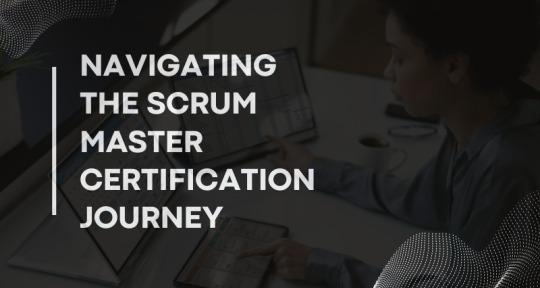
The Significance of Scrum Master Certification
The Scrum Master plays a critical role in agile development by serving as a facilitator and coach to the Scrum team.
Certification as a Scrum Master demonstrates your commitment to mastering the agile framework and your ability to guide teams toward achieving their goals.
It also enhances your career prospects in the ever-evolving field of agile project management.
Types of Scrum Master Certifications
Several organizations offer Scrum Master certifications, but the most recognized and widely accepted certification is offered by Scrum Alliance and Scrum.org. Here are the two most prominent certifications:
Certified ScrumMaster (CSM): Offered by Scrum Alliance, the CSM certification is popular and widely recognized. It focuses on the fundamentals of Scrum and the role of the Scrum Master.
Professional Scrum Master (PSM): Offered by Scrum.org, the PSM certification program offers a series of certifications that range from foundational to advanced levels. PSM certifications are known for their rigor and depth of knowledge.
Scrum Master Certification Requirements
The requirements for Scrum Master certification may vary depending on the certifying body. Here's a general overview:
Certified ScrumMaster (CSM):
Attend a two-day CSM course from a Scrum Alliance-approved trainer.
Successfully complete the course and pass the CSM exam.
Professional Scrum Master (PSM):
No specific training course is required, although Scrum.org offers optional training materials.
Pass the PSM exam, which is available in different levels (PSM I, PSM II, and PSM III) based on your desired certification level.
Preparing for the Scrum Master Certification
Preparation is key to passing the Scrum Master certification exam. Here are some steps to help you get ready:
Understand Scrum: Familiarize yourself with the Scrum framework, its roles, ceremonies, and artifacts. Read Scrum guides and recommended books to build a solid foundation.
Attend a Training Course: If you are pursuing the CSM certification, attend a Scrum Alliance-approved training course. While not mandatory for PSM, consider enrolling in a Scrum.org course or utilizing their training materials.
Practice Tests: Take practice exams and quizzes to assess your knowledge and become familiar with the exam format. Both Scrum Alliance and Scrum.org provide sample questions and practice tests.
Join Scrum Communities: Join online forums, LinkedIn groups, or local agile communities to network with other Scrum practitioners and gain insights into real-world Scrum experiences.
Taking the Scrum Master Certification Exam
When you feel adequately prepared, it's time to take the certification exam:
Register: Sign up for the exam through the certifying body's website.
Study Resources: Review your study materials and notes to reinforce your understanding of Scrum principles and practices.
Online or In-Person: Depending on the certifying body, you may take the exam online or at a designated testing center.
Exam Format: The exam typically consists of multiple-choice questions and may have a time limit. Read each question carefully and manage your time wisely.
Review and Submit: Before submitting your exam, review your answers to ensure accuracy.
After the Exam
Upon passing the certification exam, you will receive your Scrum Master certification, which demonstrates your proficiency in Scrum principles and practices. Your certification is a valuable asset for your career and can lead to exciting opportunities in agile project management.
Continuing Your Scrum Journey
Becoming a certified Scrum Master is just the beginning of your agile journey. To stay current and advance your career, consider further certifications, such as the Certified Scrum Professional (CSP) or explore roles in agile coaching, product ownership, or scaling agile frameworks like SAFe.
Conclusion
The Scrum Master certification is a testament to your dedication to agile principles and practices. By understanding the certification process, preparing diligently, and staying engaged with the agile community, you can achieve your goal of becoming a certified Scrum Master and contribute to the success of agile teams and projects.
0 notes